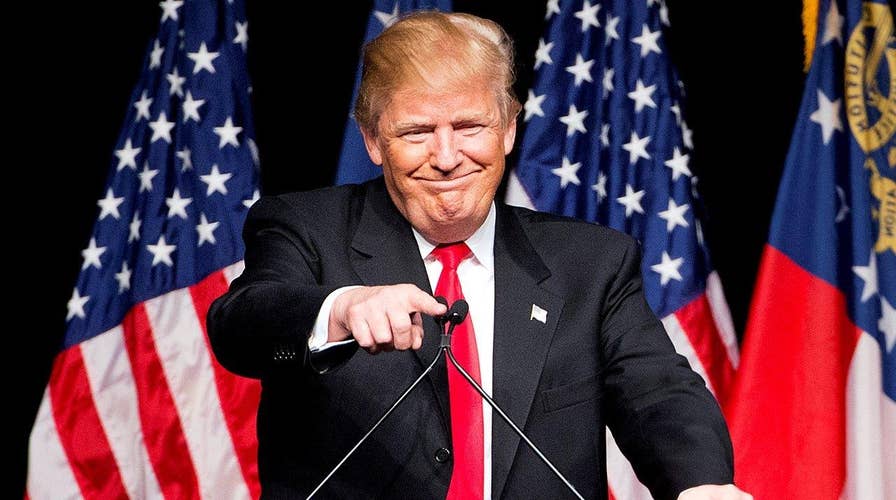Pundits belatedly acknowledge Trump as GOP frontrunner
Analysis proven wrong after recent primary wins
Coming off three straight primary and caucus victories, Donald Trump's ability to attract a variety of voters from across the Republican Party is sparking talk about whether he’s building a new kind of Republican coalition -- and, a new brand of Republican -- and whether GOP congressional candidates can ride the wave.
Trump, in racking up convincing wins in New Hampshire, South Carolina and Nevada, is dominating in almost every voter demographic, according to Fox News exit and entrance polls.
The New York billionaire businessman won among women, among evangelicals, among self-described conservatives – and even among the few Hispanics who voted in Nevada.
“We won with evangelicals, we won with young, we won with old, we won with highly educated, we won with poorly educated,” Trump said in Las Vegas after his win Tuesday night in Nevada.
So, what is a "Trump Republican?"
In terms of the political establishment, Trump's base is conflicting and a far cry from the conservative archetype, hailing from all reaches of the party -- even drawing in Libertarian and some Democratic support. He’s pro-business, he’s anti-illegal immigration, he’s pro-military. But he also favors eminent domain and used to be pro-choice – and he’s arguably tougher than Democrats on the George W. Bush administration.
Perhaps most importantly, though, one label a "Trump Republican" can claim is that of outsider – and that may be the most unifying factor of all. South Carolina and Nevada exit/entrance polls showed Trump outright dominating among voters who want the next president to be from outside the “establishment” and among voters “angry” with the federal government.
If there’s a Trump Republican coalition being formed, that dissatisfaction is playing a galvanizing role, Republican strategist Rob Burgess said.
Policy issues likely are not the “driving force” behind the phenomenon, Burgess said. Rather, those supporters are “disillusioned with the current Washington political class, which is driving them to seek out an alternative candidate.”
Burgess also doubts whether Trump’s political coattails will be long enough for many down-ticket GOP candidates to ride. “The majority of candidates will not see a boost from a Trump candidacy,” he said.
Chrys Kefalas, a Republican and first-time congressional candidate running for the open Senate seat in Maryland, told FoxNews.com that voters indeed “are not looking for a politician” this year.
He’s not yet ready to hitch his horse to the Trump wagon, but gave the billionaire credit for uniting voters.
“He’s embracing his business leadership,” Kefalas told FoxNews.com. “He’s turning out working-class voters. That’s how you run a Republican primary.”
Whether candidates like Kefalas ultimately could benefit from a coalition of sick-of-Washington Trump Republicans, though, is an open question. If Trump is the nominee, he remains such a controversial figure that some doubt whether the GOP front-runner has any real coattails.
Robert Jackson, a Florida State University political science professor, thinks nobody in the 2016 race, especially the Republicans, will have strong enough coattails for others “to reap the benefits from their candidacy”
He also argued that Trump winning the nomination would be so “personality based” that any benefit probably wouldn’t “translate down to those lower-level races” -- raising the question of whether a "Trump Republican" is simply ... Trump.
Few if any Republican congressional candidates are trying to mimic his signature anti-establishment and irreverant campaign style that attacks -- even openly denegrates -- rivals while touting huge but as-yet undefined promises, not the least of which is a Mexico-financed border wall.
A GOP member of Congress, who is familiar with the 2016 congressional field, recently told Fox News he’s yet to see an emerging Trump-style Republican in the House and Senate races.
Trump’s South Carolina victory, where he won roughly 32 percent of the vote, follows a first-place finish in the New Hampshire primary and second-place in the Iowa GOP caucuses. And his Nevada vote percentages were better than those of Marco Rubio and Ted Cruz, combined.
The field of rivals, however, isn't ready to yield. Until Nevada, Trump in any of the first three contests had yet to win more than roughly 30 percent of the vote, even as the GOP field has winnowed from 17 to five candidates, fueling the argument that his support has reached a ceiling.
On Sunday, Cruz, who won in Iowa, appeared to zero in on those percentages and argued that only a conservative can win the primary, then the general election.
“Seventy percent of Republicans don't believe Donald Trump is the right candidate to go head-to-head with Hillary Clinton and beat her in November,” he told ABC. “The only way to beat Trump is with a strong, proven, constitutional conservative.”
If Trump is building a new Republican coalition – but one that doesn’t translate to success for congressional candidates – it would mark a departure from the last major Republican movement candidate, Ronald Reagan.
In the 1980 race between Reagan and Jimmy Carter, the California governor played a vital role in helping fellow Republicans win 34 House seats and 12 Senate seats. Some would argue Republicans have been riding Reagan’s coattails ever since.
Several candidates in the 2016 race still are vying for those voters.
“What we are seeing is the old Reagan coalition coming together,” Cruz told a NBC-TV affiliate in South Carolina. “We won conservatives … We also won evangelicals and we won Reagan Democrats, and we also won young people.”
Trump suggested that his coalition would draw on Reagan’s and then some.
“We're going to bring over a lot of Democrats,” Trump told CNN. “We're going to bring over a lot of independents. We're talking about the Reagan Democrats. We're going to bring over tremendous numbers. We're going to bring over youth.”
FoxNews.com's Joseph Weber, Daniel Jativa and Adam Shaw contributed to this report.





